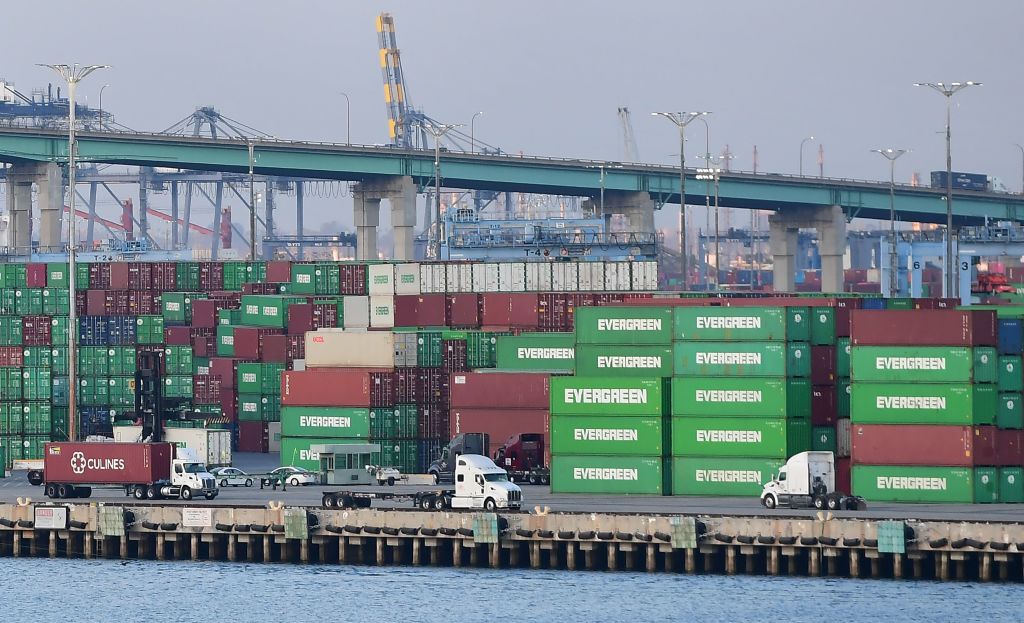Supply chains under pressure What's happening?
3:22
(CNN) -
The White House will work with private sector stakeholders in a "90-day sprint" to help ease supply chain bottlenecks, an issue that has led to higher prices for consumers and has slowed the global economic recovery from the covid-19 pandemic.
The White House, which stresses that many of the ports and companies with which it is working to help open bottlenecks in the supply chain are from the private sector, announced that some entities will operate 24 hours a day, 7 days a week, to help resolve shipping delays.
President Biden will meet with senior officials and stakeholders to discuss collective efforts to address bottlenecks in the global transportation supply chain and will then deliver a speech on Wednesday.
"The supply chain is essentially in the private sector, so we need the private sector to help solve these problems," said a senior administration official before the announcements.
The Port of Los Angeles will move to service 24 hours a day, 7 days a week, and the Port of Long Beach now operates 24 hours a day.
These two ports handle 40% of the container traffic in the United States.
advertising
What happens to the supply chain in the world?
2:59
The official also said that three of the largest freight carriers in the country, Walmart, FedEx and UPS, will commit to operating 24 hours a day.
"By taking these steps, they are saying to the rest of the supply chain: you have to move too. We are going to take a step forward," the official said, adding that the White House hopes these companies will motivate others to follow suit. .
A short-term measure
Officials also said the federal government is working with state DMVs to help increase the issuance of commercial driver's licenses in an effort to increase the number of truck drivers in the country.
They added that the White House expects the trucking and rail freight industries to extend their hours as well.
The official cautioned, however, that even with short-term solutions, industries that affect the supply chain are somewhat out of date and called for approval of President Biden's infrastructure agenda to really address the issues.
"To be clear, no matter what we do in the short term, ultimately we have a capacity problem with our ports, our freight rail, our roads and bridges. Quite simply, much of the shipping and freight infrastructure is they built decades or even generations ago, and Americans import and export much more than they did then, "the official said.
"The federal government will be a strong and willing partner in this short-term effort, but also in rebuilding a better system for the 21st century," he added.
Change in demand affecting the supply chain
The White House argued that one of the reasons for supply chain disruptions is due to increased demand, as consumer purchasing habits have changed throughout the pandemic.
"As a result, what we have seen is a huge demand for goods through our supply chain transportation system. Much of this is due to shopping being done more online, which has bigger implications, for of course, for import and for warehousing and other factors throughout our supply chain, "the official said.
But the official also pointed to the global component of bottlenecks in the supply chain, including ports and global factories that closed at times during the pandemic, limiting the ability of companies and consumers to source their products.
The official said that is one of the reasons the US is working to share vaccines with the rest of the world.
"If we can stabilize the pandemic, we know it will have a positive impact on global supply chains for a beneficial economy," the official said.
Attendees expected for Wednesday's roundtable.
(List updated to Tuesday night).
Gene Seroka, CEO, Port of Los Angeles
Mario Cordero, CEO, Port of Long Beach
Willie Adams, International President, ILWU
James Hoffa Jr., General President, Teamsters
Greg Regan, President, Department of Transportation Trades, AFL-CIO
John Furner, President and CEO of Walmart US
Dr. Udo Lange, President and CEO, FedEx Logistics
Nando Cesarone, President, US Operations, UPS
Brian Cornell, Chairman of the Board and CEO of Target
KS Choi, President and CEO of Samsung Electronics North America
Matt Shay, President and CEO, National Retail Federation
Peter Friedman, Executive Director, Agriculture Transportation Coalition
Chris Spear, President and CEO, American Trucking Association
Ian Jeffries, President and CEO of the American Railroad Association
Suzanne Clark, President and CEO of the US Chamber of Commerce.
Geoff Freeman, President and CEO of the Association of Consumer Brands
Jim McKenna, President and CEO of the Pacific Maritime Association
Economy

